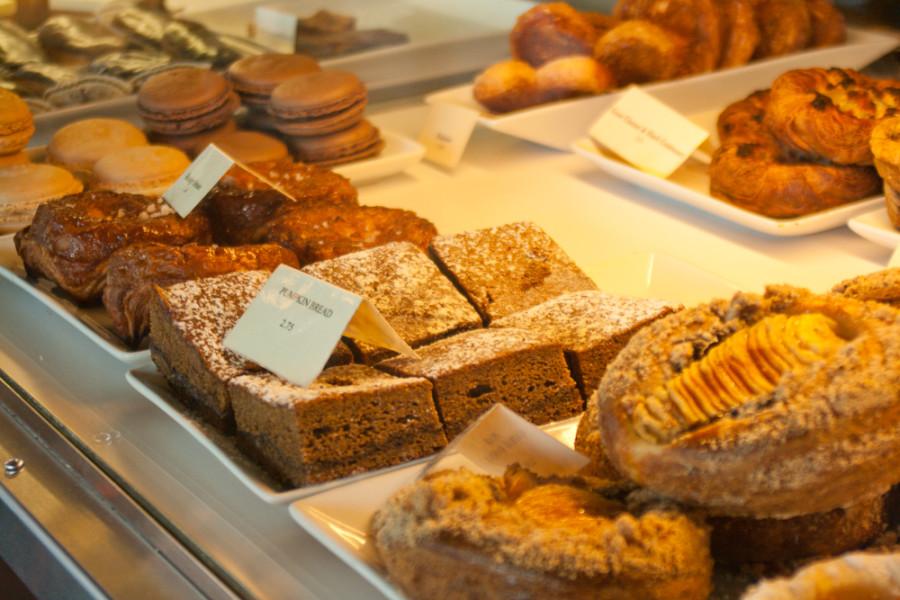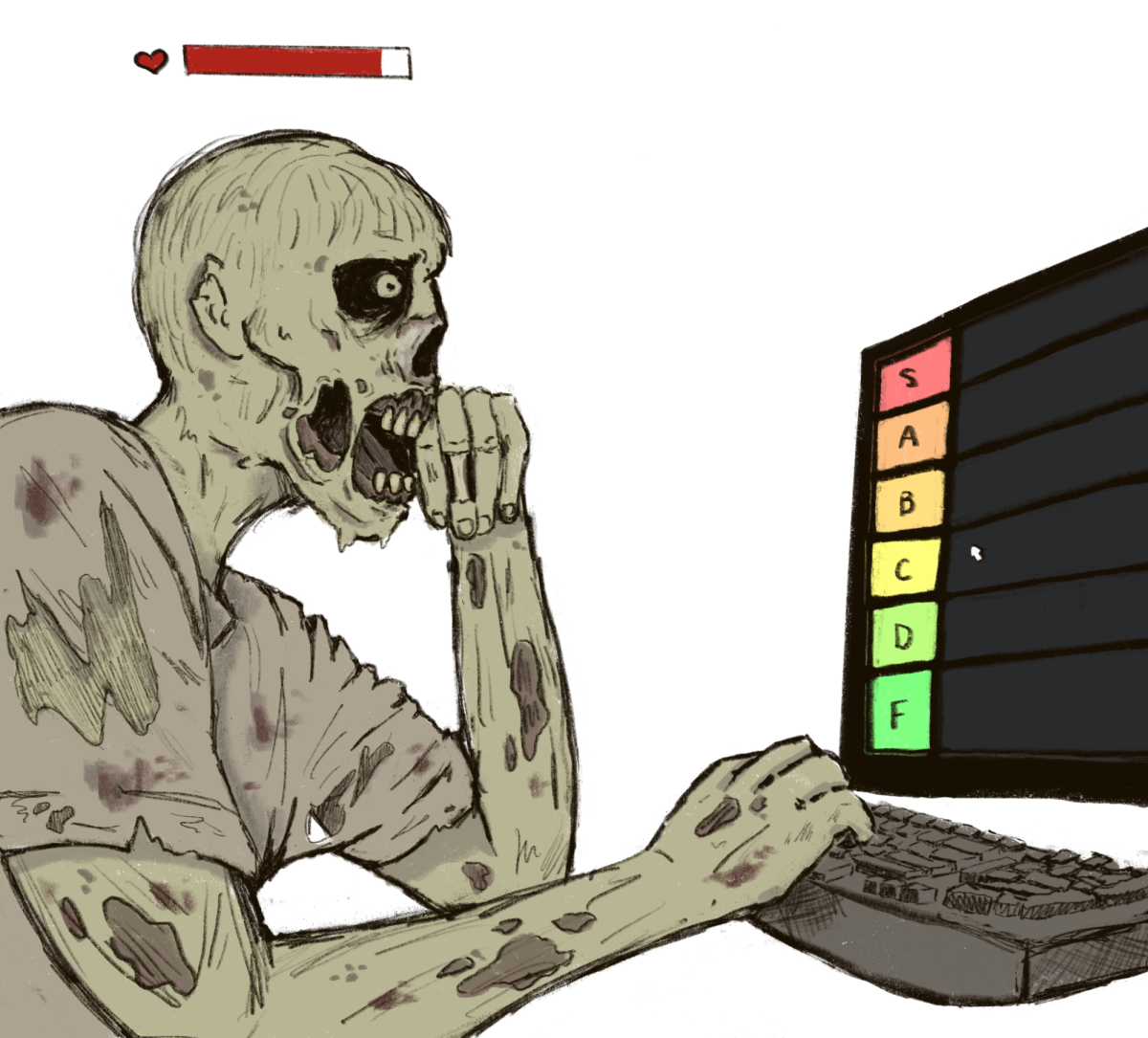I don’t think I’m the only one who has an obsession with the Colville Street Patisserie –– ask almost anyone around campus and you’ll likely only hear raves about this beloved French pastry and coffee joint.
Sophomore year, two of my closest friends and I went to the Patisserie every Saturday morning at 9 a.m. for a warm morning cup of spicy chai and an almond croissant. While abroad, one of the things I missed most about Whitman and Walla Walla was the Patisserie’s warm, inviting atmosphere and their flaky pastries.
[portfolio_slideshow]
As my senior year continues to wind down, I already feel the nostalgia of leaving Whitman and Walla Walla behind, and the Patisserie has been an integral part of my college experience. After nearly three years of Saturday morning jaunts to their shop, I finally sat down with the owners, Tiffany Cain and Whitman alumnus David Christensen ’99, to ask them a few questions.
Cain and Christensen met while they were both working for Bon Appétit at Whitman, and then they worked together at Cain’s restaurant, The Weinhard Café in Dayton, which Cain owned for 10 years. Now they are partners in business and in their personal lives.
Both Cain and Christensen have worked almost exclusively in the area for the majority of their culinary careers and have contributed to the recent changes in Walla Walla’s culinary scene. Christensen wakes up around 4 a.m. every day to begin baking, and Cain generally takes the afternoon and night shifts. Cain works the front of the house while Christensen deals with the baking duties. With less than 30 percent of sales coming from tourists, the Patisserie has built a long-standing loyal fan base.
The Pioneer: David, what made you consider going into the culinary world upon graduating from Whitman?
David Christensen: Well, Tiffany was just in the process of buying a restaurant, [The Weinhard Café], right at the time that I was graduating, so I was interested in staying around, and she had a good fit for me to get started [and] to see how that worked. I liked it, and so I kept at it.
Pioneer: Tiffany, how did you get started in the culinary world?
Tiffany Cain: I was living in the San Francisco area at the time, and I just loved the restaurant work. I loved how everything was new every day, and of course I loved food. So when the opportunity came up to buy the café, it just sort of fell into my lap. I just always loved the energy of restaurants and being around food all day long.
Pioneer: Since neither of you have attended culinary school, how did you learn how to make everything that the Patisserie produces?
DC: Just through mentorship, basically. When Whitehouse Crawford opened, I started there as a pastry assistant. So I learned a lot from a really talented cook there. I worked for the previous owner of the Patisserie, and he was really open to sharing what he knew. I think I’ve just learned a lot from people who were really generous with their knowledge.
Pioneer: Why have you both stayed in Walla Walla? Why not head to a more urban culinary scene?
TC: Mortgage, mostly. But actually, I love it here. You can have a nice work-life balance here, which can be harder in the city.
DC: The cost of living is a lot higher in places like Seattle. The quality of life is maybe not exactly what we’re looking for. Here we can afford to buy a house. We can start a place like this without taking on a lot of debt or go scrambling for financial backers. It really is a beautiful town. There are some things that some Whitman students may find limiting, and I understand that, but just as a place to live, when you can get off campus, it’s great. I feel like the town has really grown up a lot in the last 20 years since I’ve been here. There’s places to eat, [and] the weather’s beautiful most of the time.
Pioneer: What are some of the things that you love most about Walla Walla?
TC: I just love the geography. I love the hills and the little towns around Walla Walla. I love that you can drive up to Mill Creek and see the mountains close by. And I also love the food here. I like all of the people who are really devoted to doing one thing really well, like the Walla Walla Roastery or Bacon and Eggs. I like that dynamic and character.
Pioneer: Is uniqueness what you strive for?
DC: I think a lot of what makes us difference is the fact that we’re a French bakery –– there aren’t a lot of those around here. But everything is handmade and we really make an effort to keep quality really high. I feel like a lot of our customers, including Whitman students, really appreciate that. We really are kind of a “mom and pop” place and we hope that people like that.
Pioneer: Are there any struggles that come along with owning the Patisserie?
DC: The time commitment is huge. No one naturally wakes up at 4:30 in the morning, so if there was any other way to do that, I’d prefer it, but that’s just the way it goes.
TC: I think [with] small businesses, people do it because they really enjoy it. It’s hard and sometimes you have to pay your employees before you pay yourself. It’s really a devotion to it.
Pioneer: What are some things that you love to eat here? Maybe not something you could eat every day, but that you really enjoy?
TC: I really do love it all here. But if I could narrow it down, I would say I love the cannelé and the danishes –– those are the ones that really call to me every day. I love our coffee, too.
DC: I really love the lemon tart. If I’m going to take dessert somewhere, I always want to take the lemon tart or a lemon sorbet. And the cannelé –– the cannelé or an affogato are my afternoon snack once in a while.
Pioneer: Looking at your case right now, there are a number of different flavor combinations that I wouldn’t think go together. How do you envision flavor combinations and make them successful?
DC: Part of it is just trying to looking around for inspiration wherever you can. So … reading a pastry magazine every once in a while, or often we just buy large cases of some produce and we have to figure out what to do with them all. We just bought a bunch of cases of apricots, and what am I going to do with them all? Maybe apricot chamomile comes to mind, because it’s a sweet flavor and a sour flavor.
TC: He really is great at pairing things. A lot of people, if they had four boxes of apricots, they’d just make apricot … something, you know? His sense of savory and sweet is unusual, and he makes it work almost every time.
Pioneer: So does the Patisserie just buy a bunch of something in bulk and then try to think of something to make with them? Or do you go into buying something with a vision already in mind?
DC: Both ways, definitely. We bought a case of lemons and a case of sweet potatoes earlier. And the sweet potatoes will all be sweet potato pie, and the lemons, we’ll just try to use up. So we’ll make lemon curd, lemon sorbet.
TC: And sometimes, it’s just that a farmer has something totally irresistible and we have to buy it all. Sometimes you just impulse buy and then you’re just like, “Well, what do I do with these?” So that’s always fun to try and figure that out.
Pioneer: What is the craziest impulse buy that’s you’ve ever had?
DC: We bought these little green plums, and we spent hours pitting them all, and they were this beautiful color, but when you baked them, they turned brown and they weren’t beautiful anymore.
Pioneer: So what did you end up doing with them?
DC: I think I traded them with Whitehouse Crawford for a martini.
Pioneer: Is there a flavor that you would never try to work with in your shop?
DC: I probably will never try a durian. We’ve made a couple of things that weren’t well received. We made a tomato sorbet one time and it was just…
TC: Yeah, we once made a carrot-ginger sorbet that just looked beautiful, but it was too gingery and strong.
DC: It seems to be more of the vegetable-based things. There are a couple of things like that where you just have to realize that the people have spoken.
Pioneer: What are some of your favorite memories at the Patisserie?
TC: We had a wedding earlier this year. An impromptu wedding, so that was pretty cool.
DC: They were supposed to get married the day before, but they had gotten sick. They said they both really liked this place so they wanted to get married here. The bride changed in the bathroom, had the cake and ran down the street to Holly’s Flowers to get some flowers.
Pioneer: Any other favorite memories?
DC: Honestly, I love popping my head out the kitchen door and seeing people enjoy themselves. I don’t really have a specific memory of a favorite moment. When it’s really vibrant in the mornings and there are a bunch of people talking to each other, it’s great.
TC: I also really love it when people bring their babies to the shop and one of their first words is “gelato.” One little girl came in and yelled out bowl, which was her first word. Her mom had been serving her gelato by spoon, and finally she could say the word bowl … That’s great!
Pioneer: Do you have any advice for students graduating from a liberal arts school, like Whitman, that want to enter the culinary world?
DC: I was lucky enough to graduate and get a couple of good jobs in different places. I would suggest that if you’re really passionate about it, I would do that. On the other hand, I’m not going to hire someone who doesn’t have a lot of experience. We’ll definitely give someone a shot if they’ve shown they’re really interested in cooking. But if it’s possible to go get an internship somewhere, I’d say try that before going to culinary school. Culinary school is great for some people, but it’s not for everyone. I would just say cook and bake as often as you can at home. Build your basic knowledge and have something to show when showing your cover letter.

















